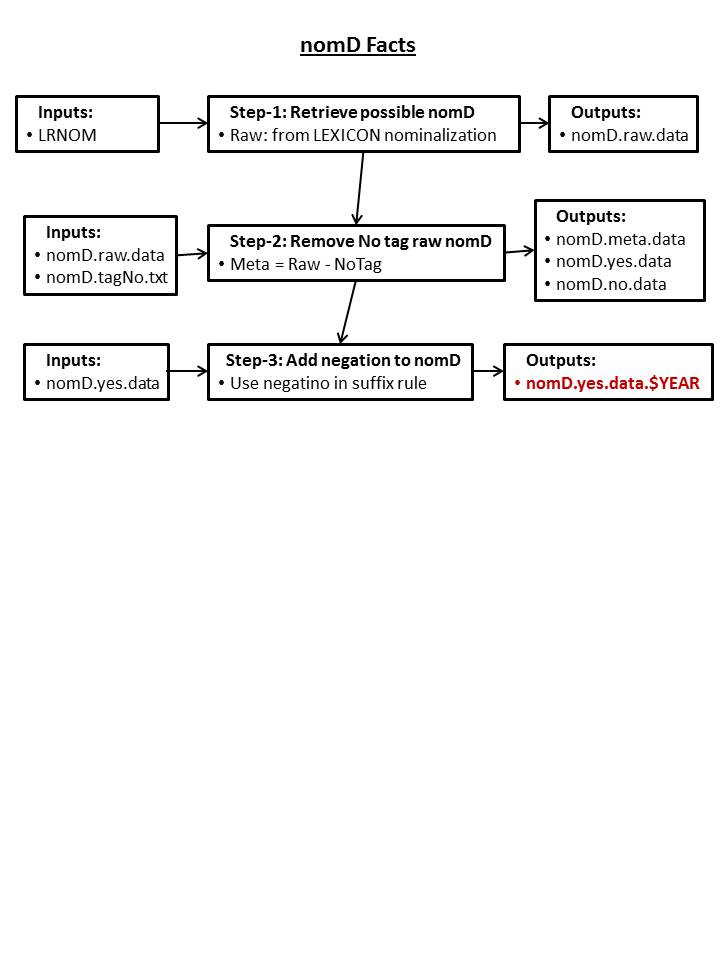Derivations - Nominalizations
I. What is nominalizations
A derivation derives a new word from an existing word, by adding an affix (prefix or suffix) to it. When the new word which is derived from another existing word via affixation is a noun, the process (and the new noun) is nominalization. For examples:
Nominalizations are a type of derivation and are coded in LEXICON in the slot of "nominalization=". Such as:
{base=kind
entry=E0036524
cat=adj
variants=reg
position=attrib(1)
position=pred
nominalization=kindness|noun|E0036531
}
{base=kindness
entry=E0036531
cat=noun
variants=reg
variants=uncount
compl=pphr(of,np)
nominalization_of=kind|adj|E0036524
}
Nominalizations are either suffixD or zeroD. From the LEXICON, we are able to
II. Nominalization derivation pairs from LEXICON
All nominalization from LEXICON are retrieved and stored in file,
LRNOM.
The format is:
| EUI 1 | Base 1 | Cat 1 | EUI 2 | Base 2 | Cat 2 |
| Base 1 | Cat 1 | EUI 1 | Base 2 | Cat 2 | EUI 2 |
Algorithm:
lookup|noun|E0222422|look|verb|E003804
grown-up|noun|E0030484|grow|verb|E0030480
III. Procedures
${DERIVATIONS}/Nominalizations/data/${YEAR}/dataOrg/LRNOM
The latest nominalization file (LRNOM) from lexicon.${YEAR}
${DERIVATIONS}/Nominalizations/data/${YEAR}/dataOrg/prepositions.data
The latest prepositions from lexicon.${YEAR}. This file is used/generated in the latest LexCheck package.
${DERIVATIONS}/Nominalizations/data/${YEAR}/dataOrg/nomD.tagNo.txt
A file lists all invalid derivations from nominalizations which need to be fixed in LEXICON. These list are not in the pattern of noun + particle|verb
shell> cd ${DERIVATIONS}/Nominalizations/bin
shell> GetNomD ${YEAR}
3
The following iterative steps are need:

IV. Programs Details (GetNomD)
| Base 1 | Cat 1 | EUI 1 | Base 2 | Cat 2 | EUI 2 |
baseParticle|noun|eui 1|base|verb|eui 2
backup|noun|E0321419|back|verb|E0011649|no
cleanup|noun|E0319808|clean|verb|E0017272|no
closeout|noun|E0587816|close|verb|E001744|no
lineup|noun|E0521627|line|verb|E0037599|no
lookup|noun|E0222422|look|verb|E003804|no
setup|noun|E0320336|set|verb|E0055458|no
takeover|noun|E0059818|take|verb|E0059816|no
washout|noun|E0065084|wash|verb|E0065081|no
base-Particle|noun|eui 1|base|verb|eui 2
cut-through|noun|E0588311|cut|verb|E0020215|no
face-off|noun|E0588571|face|verb|E0027103|no
fade-out|noun|E0587854|fade|verb|E0027177|no
pull-up|noun|E0576246|pull|verb|E0051064|no
phase-in|noun|E0588069|phase|verb|E0047185|no
set-aside|noun|E0587818|set|verb|E0055458|no
shake-up|noun|E0575525|shake|verb|E0055539|no
warm-up|noun|E0586553|warm|verb|E0065055|no
write-off|noun|E0587702|write|verb|E0065685|no
inflParticle|noun|eui 1|base|verb|eui 2
grownup|noun|E0030484|grow|verb|E0030480|no
infl-Particle|noun|eui 1|base|verb|eui 2
grown-up|noun|E0030484|grow|verb|E0030480|no
salting-in|noun|E0587997|salt|verb|E0054234|no
Please also note that above four patterns should not apply when:
chopper|noun|E0343361|chop|verb|E0016729|yes
ripper|noun|E0360460|rip|noun|E0053656|yes
shipper|noun|E0360483|ship|noun|E0055655|yes
shopper|noun|E0354647|shop|verb|E0055686|yes
snapper|noun|E0346235|snap|verb|E0056428|yes
worshipper|noun|E0554172|worship|verb|E0065637|yes
Please note that the following example is a valid derivation because it does not belong to above pattern:
run-on|noun|E0338312|run on|verb|EUI 2|yes
face-saving|noun|E0027112|save|verb|E0054430|no
decision-making|noun|E0021045|make|verb|E0038623|no
merry-making|noun|E0039645|make|verb|E0038623|no
lovemaking|noun|E0502721|make|verb|E0038623|no
warm|noun|E0065054|warmed-up|adj|E0588482|no
instability|noun|E0034830|unstable|adj|E0063378|no
irradiation|noun|E0035884|nonirradiated|adj|E0042869|no
| Base 1 | Cat 1 | EUI 1 | Base 2 | Cat 2 | EUI 2 |
| Base 1 | Cat 1 | EUI 1 | Base 2 | Cat 2 | EUI 2 | tag |
| Base 1 | Cat 1 | EUI 1 | Base 2 | Cat 2 | EUI 2 |